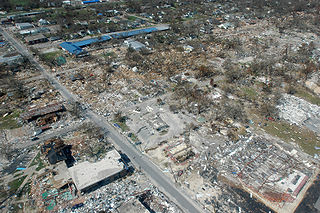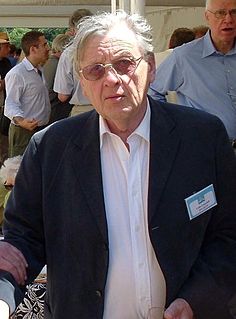
An actuary is a business professional who deals with the measurement and management of risk and uncertainty. The name of the corresponding field is actuarial science. These risks can affect both sides of the balance sheet and require asset management, liability management, and valuation skills. Actuaries provide assessments of financial security systems, with a focus on their complexity, their mathematics, and their mechanisms.
An energy crisis is any significant bottleneck in the supply of energy resources to an economy. In literature, it often refers to one of the energy sources used at a certain time and place, in particular those that supply national electricity grids or those used as fuel in Industrial development and population growth have led to a surge in the global demand for energy in recent years. In the 2000s, this new demand — together with Middle East tension, the falling value of the U.S. dollar, dwindling oil reserves, concerns over peak oil, and oil price speculation — triggered the 2000s energy crisis, which saw the price of oil reach an all-time high of $147.30 a barrel in 2008.

The International Energy Agency is a Paris-based autonomous intergovernmental organization established in the framework of the Organisation for Economic Co-operation and Development (OECD) in 1974 in the wake of the 1973 oil crisis. The IEA was initially dedicated to responding to physical disruptions in the supply of oil, as well as serving as an information source on statistics about the international oil market and other energy sectors.

Marion King Hubbert was an American geologist and geophysicist. He worked at the Shell research lab in Houston, Texas. He made several important contributions to geology, geophysics, and petroleum geology, most notably the Hubbert curve and Hubbert peak theory, with important political ramifications. He was often referred to as "M. King Hubbert" or "King Hubbert".

The Hubbert peak theory says that for any given geographical area, from an individual oil-producing region to the planet as a whole, the rate of petroleum production tends to follow a bell-shaped curve. It is one of the primary theories on peak oil.

Peak oil is the theorized point in time when the maximum rate of extraction of petroleum is reached, after which it is expected to enter terminal decline. As of 2020 peak oil forecasts range from the early 2020s to the 2040s, depending on economics and how governments respond to global warming. It is often confused with oil depletion; however, whereas depletion refers to a period of falling reserves and supply, peak oil refers to the point of maximum production. The concept of peak oil is often credited to geologist M. King Hubbert whose 1956 paper first presented a formal theory. Peak oil occurs when the cost of oil extraction exceeds the price consumers will pay. Most early analyses concentrated on increasing costs of extraction and assumed that demand would drive costs higher. More recent analyses concentrate on drop in demand as alternatives to oil become more attractive.

Colin J. Campbell is a retired British petroleum geologist who predicted that oil production would peak by 2007. He claims the consequences of this are uncertain but drastic, due to the world's dependency on fossil fuels for the vast majority of its energy. His theories have received wide attention but are disputed and have not significantly changed governmental energy policies at this time. To deal with declining global oil production, he has proposed the Rimini protocol.

Daniel Howard Yergin is an American author, speaker, energy expert, and economic historian. Yergin is vice chairman of IHS Markit, a research and information company which absorbed his own energy research consultancy Cambridge Energy Research Associates in 2004. He has authored or co-authored several books on energy and world economics, including the Pulitzer Prize-winning The Prize: The Epic Quest for Oil, Money, and Power (1991) and The Quest: Energy, Security, and the Remaking of the Modern World (2011). Yergin's articles and op-eds on energy, history, and the economy have been published in publications such as The Wall Street Journal, The New York Times, The Washington Post, and The Financial Times. All of Yergin's books have been drafted in long-hand. Currently a director on entities such as the Council on Foreign Relations and the United States Energy Association, he is also a trustee of the Brookings Institution and a long-term advisor to several U.S. administrations. He is also chairman of the annual CERAWeek energy conference.

The energy industry is the totality of all of the industries involved in the production and sale of energy, including fuel extraction, manufacturing, refining and distribution. Modern society consumes large amounts of fuel, and the energy industry is a crucial part of the infrastructure and maintenance of society in almost all countries.
CNA Financial Corporation is a financial corporation based in Chicago, Illinois, United States. Its principal subsidiary, Continental Casualty Company (CCC), was founded in 1897. CNA, the current parent company, was incorporated in 1967.

World energy resources are the estimated maximum capacity for energy production given all available resources on Earth. They can be divided by type into fossil fuel, nuclear fuel and renewable resources.
According to M. King Hubbert's Hubbert peak theory, peak gas is the point in time at which the maximum global natural gas production rate will be reached, after which the rate of production will enter its terminal decline. Natural gas is a fossil fuel formed from plant matter over the course of millions of years. It is a finite resource and thus considered to be a non-renewable energy source.

Peak oil is the point at which oil production, sometimes including unconventional oil sources, hits its maximum. Predicting the timing of peak oil involves estimation of future production from existing oil fields as well as future discoveries. The most influential production model is Hubbert peak theory, first proposed in the 1950s. The effect of peak oil on the world economy remains controversial.
This page is an index of sustainability articles.
"A Green New Deal" was a report released in the United Kingdom on 21 July 2008 by the Green New Deal Group and published by the New Economics Foundation, which outlines a series of policy proposals to tackle global warming, the current financial crisis, and peak oil. The report calls for the re-regulation of finance and taxation, and major government investment in renewable energy sources. Its full title is: A Green New Deal: Joined-up policies to solve the triple crunch of the credit crisis, climate change and high oil prices.
Sustainability measurement is the quantitative basis for the informed management of sustainability. The metrics used for the measurement of sustainability are still evolving: they include indicators, benchmarks, audits, indexes and accounting, as well as assessment, appraisal and other reporting systems. They are applied over a wide range of spatial and temporal scales.
Post Carbon Institute (PCI) is a think tank which provides information and analysis on climate change, energy scarcity, and other issues related to sustainability and long term community resilience. Its Fellows specialize in various fields related to the organization's mission, such as fossil fuels, renewable energy, food, water, and population. Post Carbon is incorporated as a 501(c)3 non-profit organization and is based in Corvallis, Oregon, United States.

Leonardo Maugeri was an Italian oil and gas expert, who was a top manager at Eni from 1994 to 2011. At the time of his death, he was Chairman & CEO of Investment firm Romulus Asset Management and a Senior Associate at the Harvard University John F. Kennedy School of Government, Belfer Center for Science and International Affairs. Maugeri sat on the Energy Advisory Board of Accenture. He previously sat on the boards of Saipem, Italgas and Polimeri Europa. Maugeri was a Visiting Scholar at the Massachusetts Institute of Technology (MIT), as well as a member of the Institute's Energy Advisory Board. He also served as an International Counselor of the Center for Strategic and International Studies.

The Institute and Faculty of Actuaries is the professional body which represents and regulates actuaries in the United Kingdom.

The carbon bubble is a hypothesized bubble in the valuation of companies dependent on fossil-fuel-based energy production, because the true costs of carbon dioxide in intensifying global warming are not yet taken into account in a company's stock market valuation. Currently the price of fossil fuels companies' shares is calculated under the assumption that all fossil fuel reserves will be consumed. An estimate made by Kepler Chevreux puts the loss in value of the fossil fuel companies due to the impact of the growing renewables industry at US$28 trillion over the next two decades-long. A more recent analysis made by Citi puts that figure at $100 trillion.












